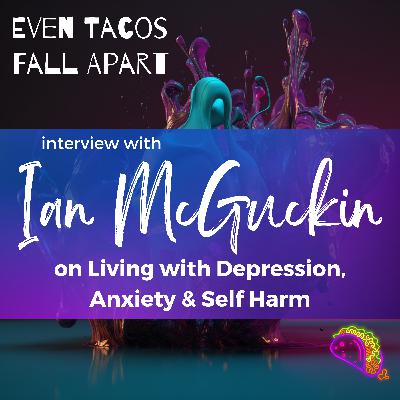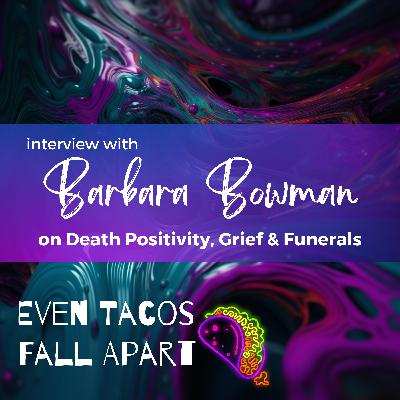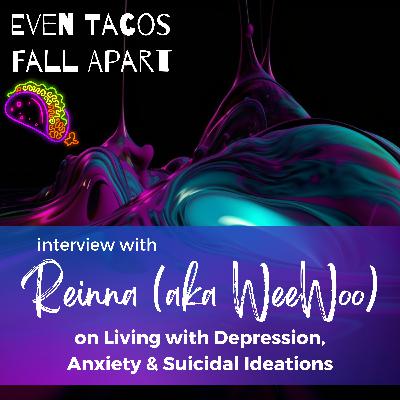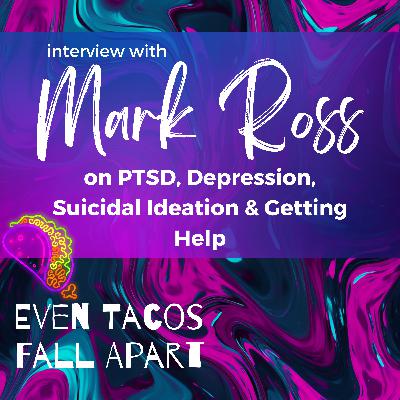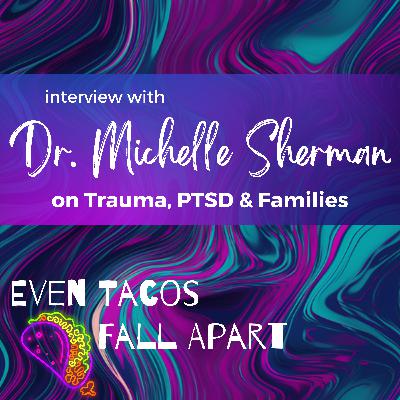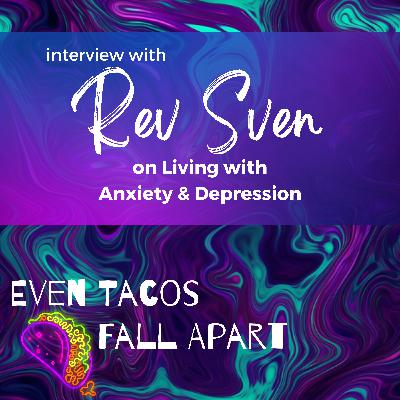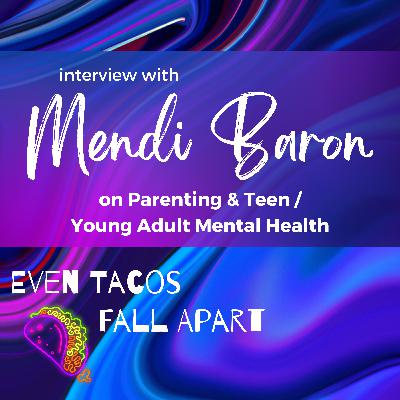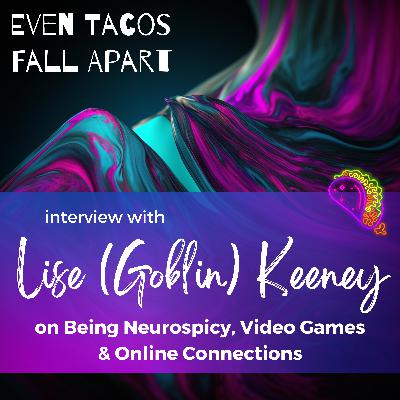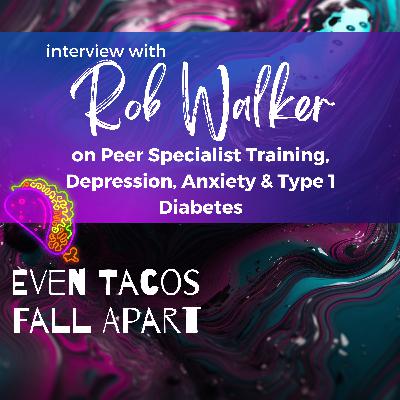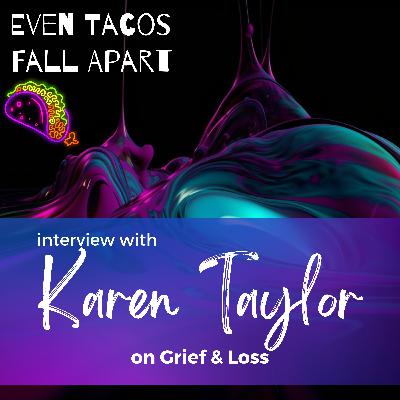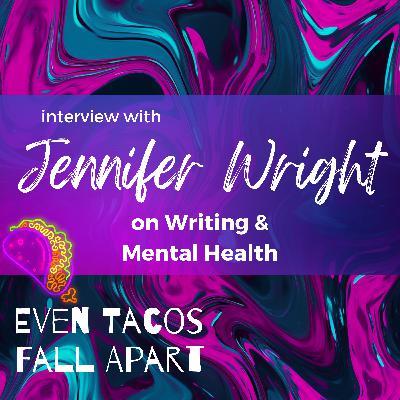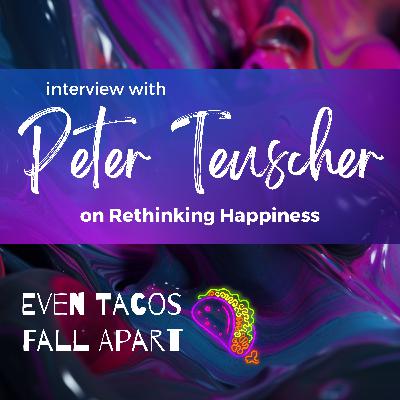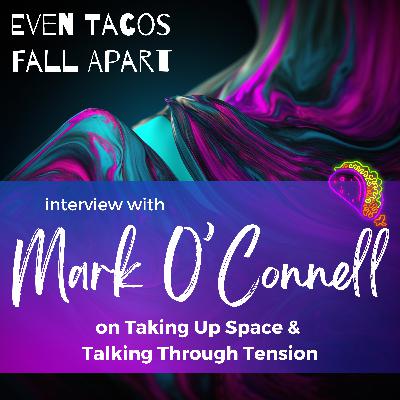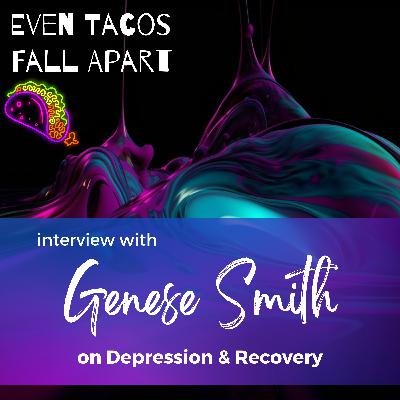Discover Even Tacos Fall Apart
Even Tacos Fall Apart

Even Tacos Fall Apart
Author: MommaFoxFire
Subscribed: 0Played: 12Subscribe
Share
© MommaFoxFire
Description
The "Even Tacos Fall Apart" talk show includes interviews with actual mental health professionals and conversations where real people talk about the messy side of mental illness, disabilities, wellness and life in general. My goal is to normalize mental health conversations and reduce the stigma around illnesses. We all struggle at different times in our lives, but that doesn't mean we're unlovable - after all, Tacos Fall Apart and WE STILL LOVE THOSE!
mommafoxfire is a MH advocate and variety gaming streamer on Twitch: twitch.tv/mommafoxfire
tacosfallapart.com
mommafoxfire is a MH advocate and variety gaming streamer on Twitch: twitch.tv/mommafoxfire
tacosfallapart.com
154 Episodes
Reverse
This episode is essential listening for anyone who's ever struggled with their mental health, loved someone who has, or wants to understand what depression and self-harm actually look like beyond the sanitized awareness campaigns.More info, resources & ways to connect - https://www.tacosfallapart.com/podcast-live-show/podcast-guests/ian-mcguckinSometimes the most powerful voices come from unexpected places. When Ian McGuckin reached out on Reddit willing to share his story, I knew we had something special. This high school senior from Michigan isn't your typical guest, but his insights into mental health run deeper than many people twice his age.Ian was diagnosed with depression and anxiety during his freshman year of high school. What followed was a difficult journey through self-harm that lasted until October of last year. But this story goes beyond the struggle. He talks about finding what actually works when the standard answers fall short.Ian describes his depression as pervasive loneliness and disconnection. "I felt like I was in my own world and I was very alone," he explains. "Like I was just an avatar walking through all the stuff and the real world was in my mind." Moving frequently as a kid left him feeling like a perpetual outsider, always one step removed from the deep connections his peers shared.His anxiety manifested mostly as social anxiety. Simple things like throwing away trash in class became overwhelming. The weight of worrying about how others perceived him was constant and exhausting.When Ian talks about overcoming self-harm, he's refreshingly honest about what worked and what didn't. Ice in his hands, rubber bands on his wrists, running until the urge passed. He emphasizes that no single tactic solved everything. It was the combination of many strategies that finally broke through.Exercise became particularly important, offering a triple benefit: distraction, physical sensation and that crucial endorphin rush. Running gave him the added advantage of getting away from whatever he might use to harm himself.Now Ian volunteers with Teens Thriving Together, a nonprofit run entirely by teenagers focused on mental health support and education. They're building a website to serve as a hub for struggling teens and working to incorporate mental health education into school curriculums nationwide.His motivation is clear: he wants to break down the stigma that kept him isolated for so long. "It happens to everybody," he says about mental health struggles. "Everybody has those times when their emotions and their brain takes hold of them."Perhaps the most important thing Ian shares is about support systems. He had caring family and friends, but often didn't reach out when he needed them most. When he finally did open up, the reactions were overwhelmingly positive. The stigma he feared existed more in his head than in reality.For anyone struggling now, Ian's advice is practical: find your community, even if it's online. Keep your hands and mind busy. Don't underestimate how many people actually care about you, even when your brain insists otherwise.Ian McGuckin is proof that teenagers aren't just the future. They're changing things right now. And we should all be paying attention.
This episode is for anyone who's ever stood awkwardly at a funeral wondering what to say, anyone supporting a grieving friend, or anyone who wants to show up better for the people they care about when life gets hard.More info, resources & ways to connect - https://www.tacosfallapart.com/podcast-live-show/podcast-guests/barbara-bowmanBarbara Bowman has lived through more loss than most people can imagine. Through those experiences she's witnessed both the beautiful and the cringe-worthy ways people respond to death and grief. Her book "What Not To Do At Funerals: A Newbie's Guide To Death" tackles the awkwardness head-on with humor and practical advice.Working in a med spa gave Barbara a front-row seat to grief complaints. After hearing countless stories about funeral mishaps and people not knowing what to do, she realized there was a gap. Nothing out there offered quick, punchy guidance for navigating these situations. So she wrote a 60-page guide you could literally download on your way to a funeral.The biggest takeaway? Grief is unique to each person and each relationship. Losing a grandparent as a kid is vastly different from losing a spouse or child as an adult. The depth of grief correlates with the hopes and dreams wrapped up in that relationship. When someone tells you they understand your pain because their grandmother died, they might not realize they're minimizing something much heavier.Barbara emphasizes that funerals aren't about you. They're about honoring the deceased and supporting the grievers. Show up. Don't be late. Dress like you're going to a job interview. No selfies. No asking how they died. And for the love of everything, don't compare your grief to theirs or tell them they should have gone to your doctor.The conversation highlighted how COVID changed everything. For several years people couldn't gather for funerals and that created a new normal where not showing up became acceptable. But people remember who shows up and they definitely remember who doesn't.One of the most powerful points: never be afraid to say the name of someone who died. Grieving people want to talk about their loved ones. If mentioning someone's name makes them cry it's because they loved that person and they'll appreciate those tears.Barbara stresses that showing up is just the beginning. The real impact happens after the funeral when everyone else has moved on. Offer to drive someone to the airport at 3am. Bring food. Check in weeks later when the shock has worn off and the emotional tidal wave hits. Small gestures create lasting bonds.As for what to say? Keep it simple. Share a memory. Tell them you're thinking of them. Admit you don't know what to do but you want to help. That honesty beats awkward silence every time.The discussion also touched on balance and self-care. Barbara celebrates small progress instead of waiting for big milestones. Wrote one page instead of three? Celebrate it. Set everything up to write but didn't actually write? That's still progress.Her teaching background shines through in her approach. She wants to give people tools and confidence to handle these situations without the sweaty palms and stress. Death is universal. We're all going to experience it. Having a quick reference guide removes the guesswork and helps people show up as their best selves when life hands us one of its hardest goodbyes.Because at the end of the day grief is about connection and so is supporting someone through it.
This episode is for anyone who's ever felt like their body failed them, anyone supporting someone through a tough recovery, or anyone who needs to hear that struggling mentally while healing physically doesn't make you weak.More info, resources & ways to connect - https://www.tacosfallapart.com/podcast-live-show/podcast-guests/lazzzybeeLazzzyBee's story starts with a simple pivot during basketball practice his sophomore year of high school. That one movement shredded his meniscus and launched him into a grueling journey through four knee surgeries, a blood clot on his birthday, and months of relearning how to walk. His coach thought he was joking around when he dropped to the ground. He wasn't.The recovery was brutal. Bee spent months bedridden with a machine moving his leg to prevent blood clots, which he got anyway. His foot swelled up and his mom insisted on getting it checked. Good call because it landed him in an ambulance to the hospital where they handed him an Apple gift card. He had a Samsung phone.What makes Bee's story compelling isn't just the physical trauma. It's how he handled it mentally with rock solid family support and a perspective shift his mom gave him: some people can handle certain things better than others. That mindset carried him through. But he admits he gave up too soon on building his strength back after he could walk again. Looking back, he wishes he'd pushed through that final phase of physical therapy.The injury changed his trajectory completely. Bee started college as a computer science major because he's good with computers and the money looked good. Math class scared him off. Then he switched to physical therapy because he wanted to help others the way his therapists helped him. That lasted until he had to pinch people's fat to measure cholesterol. Turns out he doesn't like touching people that much.Now he's studying social work with a psychology minor and it finally feels right. He's drawn to understanding how the brain works and he genuinely enjoys helping people through tough situations. His diverse friend group taught him the most important lesson: you never know what someone's dealing with behind the scenes. You can't look at a person and diagnose them or dismiss their struggles.Bee keeps busy with two jobs including one with the Cleveland Cavs, streaming, basketball, beach volleyball and collecting vinyl records. He doesn't do much formal self care because his hobbies are his stress relief. When he needs a break, he'll lay down and just listen to music. Sometimes the best self care is knowing when to step back and do nothing at all.His biggest frustration with mental health stigma? People who self diagnose others and dismiss real struggles because someone "doesn't look depressed." He's dealt with that himself. Just because someone smiled yesterday doesn't mean they're not fighting depression today. It's a chemical imbalance and most people just lack the knowledge to understand that.By the end of the episode, you'll see a young man who’s turned pain into perspective. He doesn’t sugarcoat struggle, but he radiates resilience, reminding everyone that healing (mental or physical) takes time, support and a little humor along the way.
If you're questioning whether traditional therapy and religion have all the answers, or you're caught between faith and mental health frameworks that don't quite fit, this episode is for you.More info, resources & ways to connect - https://www.tacosfallapart.com/podcast-live-show/podcast-guests/richard-tierneyRichard Tierney works with trauma survivors using a combination of visualization, spiritual practice and a modified 12-step program. He frames his approach around the idea that mental disorders stem from past trauma held by younger versions of ourselves, rather than being inherent mental illnesses requiring lifelong management.Tierney's core premise involves separating your current self from the person who experienced trauma. He argues that if you're 40 now and experienced abuse at 12, you're not the same person. Therefore, you shouldn't carry that trauma as your own identity. His healing process involves visualizing your younger self, mentally transferring the trauma back to them, and releasing it through ritualistic acts like burning written lists of grievances.He emphasizes three eight-hour segments daily: eight hours for sleep (given to God/your chosen higher power through prayer), eight hours for work, and eight hours for personal activities, hobbies and relationships. This framework aims to create resilience by diversifying your life rather than depending on one job or one person for identity.Tierney's spiritual approach doesn't require traditional religion. He encourages people to develop a personal relationship with God/your higher power through practices like writing out worries, burning the list as a burnt offering, and repeating affirmations starting with "I am" to reprogram unconscious thinking. He's explicit that this works regardless of church attendance or denomination.The conversation touched on how his approach relates to conventional mental health treatment. Tierney distinguishes between mental illness (which requires professional treatment) and mental disorders (which he believes stem from trauma). He's critical of treating symptoms through medication alone, arguing this ignores the root cause. He acknowledges that many clients struggle with letting go of victim identity, especially if their sense of purpose comes from advocacy around their diagnosis.Tierney shared his own history: childhood trauma at 12, decades spent in victim mentality, struggles with addiction and isolation and eventual recovery through 12-step programs and therapy work in Thailand. He moved from Catholicism to a more individualized spiritual practice after witnessing the church deny funeral rites to suicide victims.On forgiveness, he argues that wishing abusers well and leaving judgment to God removes their power over you, though this doesn't mean condoning their actions. He encourages people to share their stories but distinguish between what happened to their younger self and who they are today.The interview emphasized personal agency and spiritual reframing over diagnosis and medication. Tierney frames mental health challenges as soul wounds rather than brain disorders, presenting his methodology as an alternative path rather than a complement to conventional treatment.
This episode is for anyone who's ever felt broken by their own brain, anyone supporting someone through the darkness, or anyone who needs to hear that the smallest reasons to stay alive are just as valid as the big ones.More info, resources & ways to connect - https://www.tacosfallapart.com/podcast-live-show/podcast-guests/reinnaReinna came on Mental Health Monday to talk about depression, anxiety, medication abuse and suicidal ideations. At just 17, she's already navigated more medical trauma and mental health struggles than most people face in a lifetime.Her health issues started young. At 10 years old, severe stomach pain led to countless hospital visits, invasive tests and eventually gallbladder removal at 12. The pain didn't stop. Doctors thought it was Crohn's disease, then IBS, then colitis. Years later, she still doesn't have a definitive diagnosis. The constant hospitalizations meant missing school and struggling to make friends. Teachers gave her a hard time until they understood the severity of her condition. Children's Hospital became her second home.The medication abuse started in eighth grade. Depression runs in her family and she was already on antidepressants when she fell for a boy who was taking Xanax. She started taking her own pills to feel better. One became two, two became three. Soon she was taking five or six at once just to sleep. "I can't be sad if I'm asleep," she explained. When she realized she was approaching overdose territory, she told her mom. Her mother was initially angry but ultimately supportive. Her father called her a "druggy." She still struggles with relapse.Self-harm was another coping mechanism. She used to hold ice in her room when she wanted to hurt herself, finding it gave her physical pain without permanent damage. A previous guest had suggested the same technique.At 11, Reinna was sexually assaulted by one of her father's drunk friends at a party. He told her he did it because he loved her. Those words destroyed her understanding of love. She didn't fully comprehend what happened until she got older. The assault made her afraid of drunk people and left her feeling like she couldn't say no to anyone. She became a people pleaser who struggled to set boundaries. Her mom initially brushed it off until things got serious. They never pursued legal action.Reinna identifies as bisexual. She came out to her mom young, crying on the steps saying she loved people she shouldn't love. Her mom thought it was a phase. Later, during a fight with her dad about her medication abuse, she blurted out her sexuality expecting rejection. Surprisingly, her dad was more accepting than her mom.What keeps her going? Her cat July, who once headbutted her at a critical moment. Her best friend Twani, who turns dark moments into jokes. Playing video games. Her mom. Finding humor in the darkness. She's learned that helping others makes her happy, even when she needs to remember to help herself first.Reinna wants people to know that those with mental illness aren't different or abnormal. They're just people dealing with something that happened to them, no different than someone with a physical disease. She's studying philosophy and anthropology and dreams of becoming a treasure hunter or maybe even a cult leader (the inclusive, science-friendly kind).She's been clean from self-harm attempts for almost a year as of our interview. She's still here, taking care of her cat and living one day at a time.
If you've ever felt alone in your struggle, if you're carrying shame about needing help, or if you know a veteran who's suffering in silence, this episode is for you.More info, resources & ways to connect - https://www.tacosfallapart.com/podcast-live-show/podcast-guests/mark-rossIn this powerful episode, MommaFoxFire sits down with Mark Ross, a veteran and advocate who’s walked through the darkest corners of mental health and lived to tell the story. Mark opens up about his experiences with PTSD, depression & suicidal ideation, giving listeners a raw look at what it’s really like to fight your own mind every day. This conversation is real talk about pain, survival, and what it means to ask for help when everything feels impossible.Mark talks about how his mental health struggles started after his military service, but he’s quick to point out that trauma isn’t limited to combat. PTSD can come from many places, and everyone’s story looks different. What matters is recognizing the signs and getting support before things spiral. He describes the emotional numbness, the anxiety & the deep depression that followed him long after he came home. For years, he felt stuck, angry, detached & ashamed to admit how bad things really were.The turning point came when he realized that silence was killing him faster than any diagnosis ever could. He started therapy, reluctantly at first, but found that being honest with a counselor gave him space to start healing. He learned that therapy is less about “fixing” you and more about giving you tools to survive, connect & slowly rebuild your life.Mark and MommaFoxFire talk about the stigma that keeps so many people, especially men and veterans, from reaching out for help. They unpack how phrases like “man up” or “be strong” can trap people in cycles of shame and isolation. Mark admits that his lowest points included thoughts of suicide & that what ultimately saved him was connection... friends who noticed, a therapist who listened & his own decision to stop hiding behind a mask.He now uses his story to help others see that recovery isn’t linear, and it doesn’t require perfection. There are good days and bad ones, but progress counts in small moments... like getting out of bed, making a call or letting someone in on what you’re feeling.Throughout the conversation, Mark’s honesty hits hard but also offers hope. He reminds listeners that you don’t have to wait until you’re at rock bottom to reach out. Whether it’s therapy, medication, support groups or just talking with someone you trust, there are ways forward.The episode closes with both Mark and MommaFoxFire encouraging anyone struggling to take that first step toward help. It might be scary, but it’s worth it. Mark says it best: “You can’t heal what you keep hiding. Talking about it doesn’t make you weak, it keeps you alive.”This episode is a gut check and a lifeline all at once. If you’ve ever felt like you’re falling apart, you’re not alone, and this conversation proves that healing starts with speaking up.
This conversation is perfect for anyone who's been told to 'just pray harder' about their depression, pastors burning out in silence, or people wondering if faith and therapy can actually coexist.More info, resources & ways to connect - https://www.tacosfallapart.com/podcast-live-show/podcast-guests/reverend-nick-scutariReverend Nick didn't set out to become the poster child for pastors who pop antidepressants, but life had other plans. This United Methodist pastor from Minnesota joined MommaFoxFire for a raw conversation about what happens when faith meets mental health reality.Nick's journey into ministry started unconventionally. A summer camp kid who discovered God through games and guitar lessons, he initially studied music before his wife helped him recognize his calling. Now 34 and ordained for over a decade, he's learned that pastoral work can "consume your soul if you let it."The conversation took a heavy turn when Nick shared about losing his best friend Clint to cancer at just 38 years old. They'd met in seminary, bonded over shared hotel rooms and missed flights, and Clint had become one of Nick's biggest supporters. His death last July sent Nick spiraling into grief that he knew he couldn't navigate alone."I knew enough to know I needed therapy," Nick said matter-of-factly. He found comfort in Dana Trent's book "Dessert First" and Nora McInerny's TED talk about how you don't move on from grief, you move forward with it. His wife gave him space to "wallow" while still offering support.Then 2020 hit. As the world shut down and Nick was transitioning to a new church, depression crashed over him like a wave. His body felt heavy, his brain fogged, and getting out of bed became a monumental task. His wife, who lives with bipolar disorder, recognized the signs immediately. Nick's doctor diagnosed situational depression and prescribed medication."It's not a happy pill," Nick clarified. "It's a get out of bed and function pill."This brings us to the heart of Nick's mission: dismantling the church's tendency to treat mental illness as a spiritual failing. He's tired of the "just pray harder" mentality that dismisses real medical needs. When someone tweeted that brain chemicals not working properly means "store bought is fine," Nick felt seen.Nick takes a both-and approach rather than either-or. You can have Jesus and a therapist and medication. Science and Christianity are teammates rather than enemies. He's witnessed too much harm from churches that overspiritualze mental health struggles or sweep them under the rug entirely.His advice for supporting someone through mental health struggles? "Be gentle with yourself, trust the process, find your people." Don't try to carry someone else's burden for them, walk alongside them instead.As an Enneagram One (the perfectionist), Nick struggles with his inner critic. Self-care looks like using his CPAP machine, taking his medication, and accepting unproductive days without shame. His productivity doesn't define his worth - a lesson he's still learning.The pandemic has made everything harder. Nick started his new pastorship virtually, getting to know parishioners through masks and Vulcan salutes instead of handshakes. But he's committed to being authentic about his struggles, even mentioning his depression from the pulpit.When asked what misconception about mental illness he'd eliminate with a magic wand, Nick didn't hesitate: the idea that people with mental health conditions are somehow "less than" or fractional people.Nick's story is all about showing up authentically in the middle of struggles. He's proof that you can be broken and holy at the same time, that faith and therapy make good companions, and that sometimes the most pastoral thing you can do is admit you need help too.In a year when everyone's hitting rock bottom, Nick offers this: we can help each other back up. No magic required, just presence, honesty, and the courage to keep showing up.
Essential listening for anyone loving someone with PTSD, parents wondering how trauma is affecting their kids, and family members who feel like they're walking on eggshells but don't know how to help.More info, resources & ways to connect - https://www.tacosfallapart.com/podcast-live-show/podcast-guests/dr-michelle-shermanDr. Michelle Sherman spent 17 years in the VA system watching families sit in waiting rooms while their loved ones received treatment. Those families looked lost, confused and isolated. That observation launched her career specializing in how trauma and PTSD impact entire family systems, not just the person with the diagnosis.The biggest misconception? That trauma automatically equals PTSD. Most people experience some form of trauma in their lives, but most don't develop PTSD. Sherman survived a serious car accident at 70 mph that easily could have killed her. That was trauma. But like most people, she processed it naturally without developing PTSD. The distinction matters because it removes the automatic assumption that experiencing something terrible means you're broken.For those who do develop PTSD, there's reason for hope. Sherman emphasizes that PTSD can actually be cured, not just managed. Evidence-based treatments exist that can eliminate symptoms entirely. The challenge is getting people to stick with treatment since avoidance is a core symptom of the condition.Families often don't realize they're dealing with trauma's ripple effects. They might feel like they're walking on eggshells around someone who's become irritable and quick to anger. Or they experience what researchers call "ambiguous loss" when their loved one is physically present but emotionally unavailable. Kids especially struggle with this, often blaming themselves for the changes in their parent's behavior.Sherman's advice for families is straightforward but powerful: keep asking. If someone with PTSD declines social invitations or family activities, don't stop inviting them. Unless they explicitly tell you to stop, keep reaching out. They may say yes on the 50th invitation, but knowing you're still there matters enormously.Equally important is what not to do. Don't pry for details about the trauma. Don't take their emotional distance personally. And critically, don't make your entire life about being their caregiver. You need your own hobbies, friends and support system to avoid burnout.The family impact extends beyond spouses and partners. Sherman's passionate about children living with parents who have mental illness or PTSD. About 20% of kids live in these situations, yet they remain largely invisible to healthcare systems. Other countries provide legal rights and supports for these children, but the US lags behind significantly.Sherman co-authors books with her mother specifically addressing this gap. Their latest releases include resources for both teens and adults navigating these family dynamics. The books are interactive, community-reviewed efforts designed to feel like "a support group in a book" for people who might never seek traditional therapy.Her message throughout is hopeful. Trauma can be life-impacting but doesn't have to be life-defining. Recovery is possible. Families can heal together. The key is understanding that healing often happens in relationship with others, whether through therapy, support groups or simply having people who keep showing up even when you push them away.The stigma around PTSD is decreasing, treatments are improving and awareness is growing. Sherman's magic wand wish would be comprehensive recognition of how mental health issues affect children in these families, but her realistic advice is simpler: stay curious, keep caring and remember that showing up consistently matters more than saying the perfect thing.
If you've ever felt trapped by anxiety and depression, frustrated with the medical system, or wondered if there's hope beyond traditional treatment, this raw conversation with Rev Sven offers hard-won insights from someone who's navigated childhood trauma, medication dependency, and found his own path to healing. More info, resources & ways to connect - https://www.tacosfallapart.com/podcast-live-show/podcast-guests/rev-svenRev Sven's mental health journey began with childhood trauma that would shape decades of his life. Raised by his grandparents after his parents separated, he struggled with abandonment issues when his mother chose drugs over caring for him. The anger and pain manifested early, and by fifth grade, he was throwing desks into walls.Instead of therapy, his grandmother took him straight to a doctor who prescribed medication. This began a pharmaceutical carousel that lasted into his twenties. Depression became bipolar disorder, then anxiety, then intermittent explosive disorder. Sven cycled through over a dozen medications, often feeling like a zombie rather than himself.The wake-up call came while working as a delivery driver. Despite taking Seroquel the previous evening, he fell asleep at the wheel the next morning, only waking when he hit the rumble strips. That terrifying moment forced a decision: something had to change.Four years ago, Sven made the risky choice to wean himself off medication without medical supervision, something he explicitly doesn't recommend to others. He replaced pharmaceuticals with therapy, alternative approaches including medicinal marijuana and DMT, and most importantly, a supportive community.Streaming became his lifeline. What started as an accidental hobby with a friend evolved into a platform for mental health advocacy. Through his Twitch channel and work with the nonprofit Anime for Humanity, Sven found his tribe... people who understood that gamers, anime fans and other "niche" communities needed mental health resources too.His current coping toolkit is surprisingly simple but effective. When depressive episodes hit, he relies on his wife who lets him cry on her shoulder, friends in the streaming community who provide reality checks and encouragement, and the knowledge that he'll emerge from the darkness. A schnauzer mix puppy has become an unexpected emotional support companion.Sven still battles the same demons. He describes episodes where he feels worthless, convinced everything he does is meaningless and that people won't miss him when he's gone. During these periods, he sleeps excessively and isolates himself. But now he has tools and people to pull him back.His story highlights several critical issues: the overprescription of psychiatric medications to children, the importance of therapy alongside or instead of medication, and the power of community support. Living in rural Oklahoma (a region not known for progressive mental health attitudes) Sven works to break stigma one conversation at a time.The streaming community surprised him with its openness about mental health struggles. Unlike his closed-minded hometown where men aren't supposed to show emotion, online spaces offered acceptance and mutual support. Even his brother, struggling with addiction, now reaches out for help after seeing Sven's transformation.Sven's message is clear: mental illness doesn't make you broken or crazy, you're just wired differently. His journey proves that with the right support system, alternative approaches can work, though he emphasizes working with medical professionals rather than going it alone like he did.From throwing desks to building community, Rev Sven turned his pain into purpose.
If you're a parent losing sleep over your teenager's mood swings, wondering when normal adolescent drama crosses into mental health territory, or feeling completely outmatched by a generation that creates group chats in Google Docs, this episode is your reality check and roadmap.More info, resources & ways to connect - https://www.tacosfallapart.com/podcast-live-show/podcast-guests/mendi-baronLicensed clinical social worker Mendi Baron brings a unique perspective to teen mental health, shaped by his own teenage rebellion and his current role running multiple behavioral health treatment centers. His journey from "pain in the ass teen" to mental health professional began at 17 when a stranger told him that struggling peers credited him with keeping them alive.Baron destroys three major parental misconceptions head-on. First, parents drastically underestimate teen tech savvy. While adults fumble with firewalls, kids create Google Doc group chats on school Chromebooks. Second, the "best years of your life" narrative is garbage. Teens juggle brain development, body changes, social pressures, school stress and social media while their brains are still under construction. Third, the "handle it ourselves" mentality fails because parents lack the proper context and information to navigate modern teen challenges alone.The secret sauce isn't complicated but requires intentional work. Parents must recognize that relationships need complete overhauls at each developmental stage. The way you relate to a 10-year-old won't work with a teenager, and that won't work with an 18-year-old. Baron advocates for "setting the stage" through consistent, phone-free connection time before problems arise. Create safe spaces for conversation, not crisis intervention sessions.Teens crave predictability despite what they tell you. Baron recommends written "home contracts" covering expectations, consequences and support systems. This isn't about being controlling but creating clear rules of engagement. When teens know exactly what happens if they miss curfew, they can make informed choices about whether they're willing to face those consequences.Baron uses a multi-area approach to spot trouble. Look for changes in social connections, emotional regulation, school performance and basic functions like eating and sleep. Individual flags mean little, but patterns across multiple areas signal real problems. Sleep disruption particularly impacts everything from anxiety levels to academic performance.When professional help becomes necessary, involve teens in therapist selection to ensure buy-in. School counselors and Psychology Today provide solid starting points for finding local resources. The biggest mistake parents make is assuming they can handle complex mental health issues with the same confidence they bring to other life challenges.Baron challenges the common therapeutic approach of finding personal connections with teen clients. Instead, he maintains clear boundaries while supporting teens in reaching their own goals. Trust develops not through shared experiences but through consistent, non-judgmental support and absolute confidentiality except in safety situations.Mental health conditions aren't just deficits to manage. ADHD provides incredible multitasking abilities once properly channeled. Anxiety and depression can be harnessed as strengths when understood correctly. Baron's favorite life hack involves making decisions within 20 seconds to avoid overthinking paralysis.For parents feeling lost in the modern landscape of teen mental health, Baron's message is clear: educate yourself, create structure, maintain boundaries and don't hesitate to bring in professional support when needed.
If you’re neurosparkly yourself, love gaming or have ever wondered how online friendships can be just as real as in-person ones, this episode is for you.More info, resources & ways to connect - https://www.tacosfallapart.com/podcast-live-show/podcast-guests/lise-goblin-keeneyIn this episode, MommaFoxFire sat down with Lise Keeney, also known as Goblin, to talk about neurodivergence, gaming and how online spaces can create genuine friendships. Lise is a brand strategist and PR professional turned founder of Goblins, a voice-based platform that helps people connect through gaming. Her journey into building Goblins grew out of both personal loss and the desire to create spaces where neurodivergent people could feel comfortable being themselves.Lise shared her path from working with startups like Hinge to launching her own project. She joked that she has always had a “goblin answer” to career questions, but what has carried her through is creativity, curiosity, and the drive to help people connect in authentic ways. After her father passed away in 2022, she found herself craving community but not the energy it takes to go out and meet new people in person. That gap inspired the idea behind Goblins: a way to find real connection without leaving your home.A big part of the conversation centered on what it means to be “neurospicy,” Lise’s preferred term for her own mix of ADHD and autism traits. She described how those traits show up as both strengths and struggles. On one hand, being neurodivergent often means heightened creativity and out-of-the-box problem solving. On the other hand, it can come with challenges like focus issues, people-pleasing tendencies or sensory overload. By embracing the label of neurospicy, she found both humor and empowerment.The two also talked about how video games serve as more than entertainment. For many neurodivergent folks, games offer structure, space to hyperfocus, and a low-stakes way to socialize. Lise pointed out that some of her gaming friends know her better than people she’s known in real life for years. There is something disarming about playing in a shared digital space that makes opening up easier than sitting across a brunch table. MommaFoxFire agreed, sharing her own experiences with friendships formed through gaming and how those bonds can feel just as real and even more consistent than offline relationships.They also explored the kinds of games that foster connection. Competitive or high-intensity games like Call of Duty can make conversation harder, while cozy worlds like Palia or Minecraft let people talk while exploring together. These lighter games allow for parallel play, where people can hang out in voice chat while chopping trees, crafting, or just existing in the same virtual world. The result is an environment where conversation flows naturally.Another theme was safety and community care. Lise explained that Goblins uses voice-first interaction and strong moderation to cut down on harmful behavior. The community of about 2,500 goblins on Discord is quick to welcome newcomers, celebrate glow-ups, and even nudge each other with friendly accountability. From D&D groups to Monster Hunter squads, the connections have already led to lasting friendships, relationships and even in-person meetups.Throughout the episode, both MommaFoxFire and Lise underscored that video games are not a distraction from “real life” but a powerful tool for mental health and connection. Goblins is proving that you can meet friends, find belonging, and even fall in love without forcing yourself into traditional social spaces. Lise’s story shows how being unapologetically neurospicy, leaning into gaming, and building inclusive platforms can create kinder, more meaningful communities online.
If you live with depression, anxiety, or chronic illness, or if you want to understand how peer support can make a real difference, this episode with Rob Walker is for you.More info, resources & ways to connect - https://www.tacosfallapart.com/podcast-live-show/podcast-guests/rob-walker-2In this episode of Even Tacos Fall Apart, I sat down with Rob Walker, a peer support leader who brings decades of lived experience with depression, anxiety, and type 1 diabetes to his work. Rob lives outside Boston, works with the Massachusetts Department of Mental Health, and has been helping shape the peer support workforce both in his state and around the world. He’s also a father of three and a dog dad to Hank, his rescue beagle.Rob shared how his career has grown out of turning hard personal experiences into meaningful advocacy. He helps oversee the Certified Peer Specialist training program in Massachusetts, where people with lived experience learn how to share their own stories in ways that support others. Beyond that, he and a team from Dartmouth College created a training during COVID that taught peer specialists how to provide support remotely using tools like Zoom, Discord and Teams. What started as a small project has now trained more than 3,000 people across the U.S. and internationally.When asked what being a peer support specialist means to him, Rob said it gives purpose to years of difficult times. Instead of seeing his diagnoses as only negative, he has found a way to use those experiences to connect with others and remind them they are not alone. He also stressed that the heart of peer support is the relationship, not the method of delivery. Whether it’s a Zoom call, text or even playing a video game online, what matters is the connection.Rob was candid about challenges too. One ongoing frustration is the way clinical language can reduce people to their diagnoses. He explained how often professionals see him or others as 99 percent “the illness” and only one percent “everything else.” In reality, his diagnosis is just a small slice of his identity, alongside being a father, friend, husband and colleague. He wants more professionals to see people for their whole selves, not just a label.We talked about how important advocacy is, both at the legislative level and in everyday life. Rob encouraged listeners to follow bills in their state, join advocacy organizations, and speak up when policies affect people with mental health challenges. On a personal level, he suggested simple acts like checking in with friends, sending a quick text or offering to listen. Often those small efforts make the biggest difference.Self-care was another key theme. Rob admitted he doesn’t always follow his own advice, but he tries to schedule downtime and recognize the signs when he’s slipping. He emphasized that people working from home during the pandemic shouldn’t expect perfection. His reminder: give yourself a break, seventy percent is good enough and don’t feel guilty about it.Rob also opened up about living with type 1 diabetes since age 15 and how managing both physical and mental health requires attention to sleep, nutrition, and knowing his warning signs. His honesty about symptoms like fatigue, irritability, and hearing voices during severe depression gave listeners a real picture of what those struggles can look like.He closed with a powerful wish: to erase the misconception that people with mental illness are violent. In fact, they are far more likely to be victims of violence than perpetrators. His final advice was simple but important: be kind to others and to yourself.
If you’ve ever struggled with loss, felt unsure how to support someone grieving, or wondered why you’re not “moving on” fast enough, this episode is for you.More info, resources & ways to connect - https://www.tacosfallapart.com/podcast-live-show/podcast-guests/karen-taylorIn this episode of Even Tacos Fall Apart, MommaFoxFire sat down with grief educator and coach Karen Taylor for a raw conversation about loss and what it means to live with it. Karen’s path into this work began after her sister died in a house fire in 2019. The loss turned her life upside down, and she realized how poorly equipped most of us are when it comes to handling grief. Outdated models like the “five stages of grief” left her feeling broken because they didn’t reflect her lived experience. That realization pushed her to train as a grief coach and educator, determined to bring a modern, compassionate perspective to how we support each other.Karen explained the difference between grief and grieving. Grief itself is the pain and emotion tied to what we’ve lost. It never goes away because it’s bound to the love and attachment we still hold. Grieving, on the other hand, is the longer-term process of adapting to life after a loss. That can involve rediscovering who we are once the roles we’ve lived in shift (like becoming a widow, losing a parent, or even facing divorce or job loss). She emphasized that grief isn’t limited to death. Any major change, even the absence of a childhood we needed but didn’t have, can leave behind grief.One theme Karen returned to again and again is how badly society handles grief. In the weeks right after a loss, people swarm in with food, calls, and cards. But around the two-month mark, support often dries up just as the hardest part sets in. That’s when loneliness and pain deepen. For Karen, the lesson is simple: there are no perfect words to offer, only presence. Just showing up and continuing to acknowledge the person or loss matters far more than any attempt to fix things.She also talked about the responsibility grieving people have to speak up about what they need. When her father died, Karen realized she had to clearly communicate her needs to her partner instead of expecting him to guess. That meant asking for regular time to talk about her dad, more hugs, and not being treated as broken. Setting boundaries and naming needs transformed how she was supported.Karen addressed some common myths too. The idea that “time heals all wounds” is misleading. Time alone doesn’t do anything... it’s what you do with that time that matters. Grief will resurface in unexpected moments years later. A song, a smell, or an anniversary can bring back a wave of pain, and that’s normal. The goal isn’t to “get over” grief but to learn how to carry it alongside love and meaning.She described practical tools she uses with clients, like the “loss inventory,” where people go back through their lives to name losses they never recognized as grief. She also uses hypnosis to bypass surface thoughts and help people revisit stuck emotions.The conversation underscored that grief is deeply individual. There’s no one right way to do it, and there’s no finish line. What matters is honesty, compassion, and continuing to talk about the people we’ve lost so they aren’t erased from memory.
If you’ve ever wanted to use writing to process your thoughts, manage stress, or work through tough emotions (whether you’re a lifelong journaler or haven’t written since school) this episode is for you.More info, resources & ways to connect - https://www.tacosfallapart.com/podcast-live-show/podcast-guests/jennifer-wrightIn this episode of Even Tacos Fall Apart, MommaFoxFire talks with Jennifer Wright about writing, creativity, and how putting words on paper can be a powerful tool for mental health. Jennifer herself is a writer, editor, publisher, artist, and stand-up comedian, and she helps leaders tell their stories through her Authors Way podcast, her 90-day Authors Way Journal, and her work with Leadership Portraits.Jennifer’s path to this work wasn’t a straight line. She spent decades in corporate project management and strategy, but writing was always tugging at her. A layoff pushed her into professional copywriting, which eventually led to helping a friend write her first book. Word spread, more people asked for help, and a new career was born.When it comes to balancing creative work with well-being, Jennifer admits it’s not always perfect. Her corporate skills in organization and strategy help her juggle multiple projects, but she also leans on art and comedy as outlets. Painting is her meditation, and helping comedy students write jokes keeps her energized.Writing has been part of Jennifer’s life since childhood. As an introvert, it gave her a safe way to process her thoughts. She still prefers pen and paper for creative work, noting that research shows handwriting activates more parts of the brain than typing. For her, writing is both a release and a way to make sense of emotions... and it can be healing even if no one else ever reads it.She encourages people to write without worrying about skill level, grammar, or perfection. The goal is to get the words out. Writing can help process trauma, problem-solve, and unlock creativity. Jennifer’s advice for beginners: make it a habit, whether that’s daily, weekly, or in weekend sessions. Create a space, use tools you enjoy (colorful pens, big sketchbooks, plain notebooks), and write in whatever way feels comfortable.With the leaders she works with, burnout and mental health come up often. She’s seen companies start to pay more attention to employee well-being, though there’s still a long way to go. She believes regular sabbaticals could improve productivity and loyalty, and she’s taken one herself to reset.Common blocks she sees in writers include lack of energy (often mistaken for lack of time) and fear of judgment. She suggests adjusting when you write to match your energy levels, taking creative breaks to avoid burnout, and remembering you can choose how and with whom to share your story.Her editing pet peeve? Overly long sentences. Shorter sentences and paragraphs keep readers engaged. She loves working with writers early in the process but can step in at any stage.Jennifer’s Authors Way Journal offers daily prompts, gratitude space, and a “word of the day” to help people build a consistent writing habit. She’s seen it spark healing and creativity for many users. She also shared simple emotional writing prompts like starting with “I love…,” “I hate…,” or “I don’t understand…” and writing without stopping or editing.Currently, Jennifer is developing a collaborative book featuring women leaders to help close the gender gap in leadership literature, and she’s relaunching her podcast. Her biggest wish is for people to understand that mental health differences aren’t “bad,” they’re just part of what makes us unique.
This episode is for anyone who's ever hit "submit" on a project and immediately started spiraling about everything they could have done better, or who looks successful on the outside while battling a relentless voice inside that insists they're not good enough.More info, resources & ways to connect - https://www.tacosfallapart.com/podcast-live-show/podcast-guests/nichole-coyneLicensed clinical social worker Nichole Coyne joined MommaFoxFire for a refreshingly honest conversation about that nagging voice in your head that tells you you're not good enough. As someone who specializes in high functioning anxiety and owns Higher Ground Wellness, a virtual private practice, Coyne brought both professional expertise and personal transparency to the discussion.Your inner critic is that constant internal narrative everyone has, formed by our earliest caregivers and experiences. Coyne breaks it down into three distinct voices:The Monger is the brutal negative self-talk machine. It's the voice screaming "you're going to fail" while paradoxically pushing you to work harder to prove it wrong. This voice creates anxiety and drives that endless cycle of burnout.The BFF wants to comfort you but takes it too far. Think of that college friend who wanted to skip studying for drinks—it's all about soothing and avoiding discomfort, often leading to procrastination.The Advocate is the voice most people can barely hear. It's the one that says "that meeting was tough, but you handled it well—now go take a walk and decompress." This is the voice we need to amplify.High functioning anxiety isn't an official diagnosis, but it perfectly captures a growing phenomenon. These are the people who look incredibly successful from the outside—always meeting deadlines, showing up early, getting things done. Inside, they're battling constant self-doubt and that spiraling inner dialogue.The twist? That voice often gets loudest after completing something. You hit submit on a project and immediately start catastrophizing about every possible mistake. Sound familiar?Coyne's approach is refreshingly practical. First, acknowledge the voice. Name it. Even tell someone "my inner critic is really loud today." Once you recognize it, you can start questioning whether these thoughts are actually facts (spoiler: they're not).Her "three and five rule" is genius in its simplicity. Pick three important tasks for shorter time periods, five for longer ones. One of those tasks can be self-care, like making yourself a decent lunch. This prevents the endless to-do list spiral that leaves you feeling like you accomplished nothing despite crossing off multiple items.One of the most striking insights was how perfectionism complicates grief. Perfectionists want to fix everything, but grief requires sitting with uncomfortable feelings. This creates a dangerous loop where major losses trigger high functioning anxiety as people try to control the uncontrollable through hyper-productivity.Coyne emphasized that recovery isn't about spa days and manicures, it's about doing the hard stuff that actually serves you, like managing your budget or taking actual time off. She practices what she preaches, dedicating Sunday afternoons to disconnecting completely.The bottom line? Your thoughts aren't facts, productivity doesn't equal worth, and that critical voice doesn't have to run the show. Sometimes the most productive thing you can do is absolutely nothing at all.
If you're overwhelmed, burned out or just trying to make it through the day without falling apart, this episode is for you.More info, resources & ways to connect - https://www.tacosfallapart.com/podcast-live-show/podcast-guests/courtney-schulnickIn this episode, I sat down with Courtney Schulnick to talk all about mindfulness and how it actually fits into messy, busy, real life! Courtney spent almost 20 years as a high-pressure litigator at a major law firm in Philly. The work was demanding and stressful. When she had her first child, she managed. When her family grew and life threw her fertility struggles and long sleepless nights, she kept pushing through. But she was burning out. Badly. That’s when her therapist suggested mindfulness.At first, Courtney was skeptical. The idea of committing to a two-and-a-half-hour class every week, plus daily home practice, felt impossible. But eventually, she realized something had to give. She signed up for an MBSR (Mindfulness-Based Stress Reduction) course and it completely shifted how she moved through the world. The stress didn’t go away, but her relationship to it did. She started feeling more present, more grounded, more in control. She not only learned to function better at work, she learned to show up for her life.We talked about how mindfulness helped her navigate the pressures of law while raising three boys, and how it ultimately bought her another ten years in a career she had nearly burned out of. She now teaches MBSR herself and helps high-performing professionals find balance without sacrificing their ambition.Courtney broke down what mindfulness actually is: moment-to-moment awareness, without judgment. It’s not about clearing your mind or sitting in silence for hours. It can be as simple as noticing your feet on the floor or being fully present while brushing your teeth. And it works. There's a growing body of scientific evidence showing that mindfulness reduces anxiety, depression and even boosts immune function.She also tackled the idea that mindfulness is just another luxury or self-care chore. It’s not. It’s a way of being, not a task to check off a list. And yes, even busy people can do it. You don’t need to dedicate hours to see the benefits. A few minutes a day can make a difference.We also talked about how mindfulness intersects with trauma. Courtney was clear: mindfulness is powerful, but it’s not for everyone at every moment. If someone is navigating trauma or deep depression, it's important to be mindful about mindfulness (pun intended) and to have professional support in place.Throughout the conversation, Courtney’s warmth and honesty stood out. She shared personal stories, like stealing Snickers bars as a kid, and how her kids now remind her to slow down. We laughed about egg cups, Instagram reels and the ongoing challenge of being present as a parent in a world that never stops pinging.If you've been curious about mindfulness, or if you're overwhelmed and looking for a way to show up more fully in your own life, this episode is a great place to start.
If you've ever wondered why happiness feels out of reach even when life looks “fine” on paper, this episode is for you.More info, resources & ways to connect - https://www.tacosfallapart.com/podcast-live-show/podcast-guests/peter-teuscherIn this episode of Even Tacos Fall Apart, MommaFoxFire sits down with Peter Teuscher, a life coach and author of Rethinking Happiness, to talk about what happiness really means and how most of us are looking for it in all the wrong places.Peter shares how his personal experience with childhood depression and years of unrecognized struggle eventually pushed him into therapy and personal development. That journey led him to coaching and ultimately writing a book that challenges the surface-level definitions of happiness we often grow up with.He explains that happiness isn’t a finish line or a goalpost, it’s a kind of feedback system. When your life lines up with your values, you’re more likely to feel grounded and content. But when there’s a mismatch, happiness feels out of reach. And that’s a huge problem, because so many people are chasing society’s version of happiness (the “checklist” life with the job, the partner, the money) instead of figuring out what actually matters to them.Throughout the conversation, Peter emphasizes that authentic happiness comes from small, consistent moments of connection, fulfillment and purpose... so going beyond the big wins. He talks about learning to appreciate the ordinary, like being in nature or spending time with loved ones, and how those moments can be more meaningful than hitting major milestones.Peter also gets into the importance of defining your own core values. He shares a simple, powerful exercise using Post-its (or just a piece of paper) to help identify the values that matter most and warns that living out of alignment with those values is a fast track to dissatisfaction.They also cover a common trap: performative happiness. Peter reminds listeners that chasing joy isn’t about pretending everything is great or avoiding hard things. It's about being real with yourself, doing the inner work and creating habits that support your well-being... even when life is messy.He speaks candidly about how trauma, chronic illness and mental health challenges can complicate the pursuit of happiness, and stresses that telling someone to “just be happy” is both unhelpful and dismissive. Real change happens through small, intentional shifts... not toxic positivity or fake smiles.Toward the end, they explore social media’s impact on mental health, the pressure to constantly feel good, and the way happiness can sometimes be mistaken for external validation. Peter’s take? Stop comparing. Start tuning in. Let happiness be the outcome of living in alignment, not the prize for winning a game you never agreed to play.If you’ve ever found yourself wondering, Why don’t I feel happy even though I “should”? - this conversation is for you. It’s honest, hopeful and filled with real tools to help you rethink what happiness looks like in your own life.
If you’ve ever felt dismissed, talked over, or unsure how to handle tense conversations without losing yourself, this episode is for you.More info, ways to connect & resources: https://www.tacosfallapart.com/podcast-live-show/podcast-guests/mark-oconnellIn this episode of Even Tacos Fall Apart, MommaFoxFire sits down with Mark O’Connell, a psychotherapist based in NYC with a background in acting. The conversation centers around how we can communicate with people whose perspectives feel combative or totally different from our own, and why it’s important that each of us takes up space and feels seen - even when things get tense.Mark opens up about how his acting experience shaped the way he practices therapy today. He doesn’t view acting as pretending but as truth-telling. That mindset carries into the therapy room, where he works to understand his clients deeply, noticing not just their words but the energy behind them. He says therapy, much like acting, is about being fully present, responsive and curious in the moment.One of the biggest takeaways from the conversation is the idea of mutual recognition. Mark explains that it’s less about changing someone’s mind or winning an argument and more about seeing and being seen. Especially during high-stakes conversations, like the ones we often have with family during the holidays, it’s not helpful to go in expecting agreement. What helps more is showing up with vulnerability, stating your truth clearly and being curious about the other person’s experience. That’s where real connection starts.Mark also addresses how exhausting it can be to try to talk across drastically different realities - like when two people don’t even agree on what’s true. He suggests setting boundaries where needed and giving yourself permission to disengage if the conversation feels unsafe. But he encourages people not to lose hope. Even when it feels impossible to reach someone, keeping the possibility of mutual understanding alive can be powerful.They also talk about what it means to “take up space.” For some people, that might mean speaking up more. For others, especially those who are already vocal, it might mean sharing vulnerability or emotion - things they usually keep hidden. Mark encourages listeners to notice their own patterns and stretch in whatever way helps them feel more whole.Throughout the episode, there’s also a very real, very human tone. They talk about the mental load of parenting, the impact of toddlers on your brain, and how hard it is to balance emotional labor with daily life. Mark mentions how hard it can be to get therapy covered by insurance and stresses that good therapy should be more accessible.The conversation wraps with a wish to throw out the idea that mental health is something you either “have” or don’t. Mark wants people to understand that mental health exists on a spectrum, and we’re all navigating it. He encourages folks to stop boxing themselves in with labels and instead think about how to stay present, be curious and make room for their full selves.Whether you're headed into a hard conversation, feeling unseen, or just trying to be better understood, this episode is a thoughtful, grounded reminder that communication is more about connection than agreement!
If you're a parent, educator, or advocate who's ever struggled to support kids with disabilities in school, this episode is a must-listen for real talk, hard truths, and practical ways to do better.More info, resources & ways to connect - https://www.tacosfallapart.com/podcast-live-show/podcast-guests/shannon-addisonIn this episode of Even Tacos Fall Apart, Shannon Addison joins me to talk about disabilities and youth in schools. Shannon is a mom, writer and creator of My Crummy World, a brand built to help kids (especially girls) navigate emotional health, friendships and confidence through story-driven tools like characters, recipes and problem-solving activities. Her work is rooted in her own journey as someone who’s watched bullying and relational aggression happen right under the noses of adults who were supposed to be paying attention.Shannon shares how her daughter’s chronic illness became a disability that changed everything - from how she participated in school to how peers treated her. She talks candidly about how cruel kids can be, how isolating school can feel when you’re “different” and how parents often get thrown into advocacy without a map. We talk about how invisible disabilities, like dysautonomia or anxiety, get overlooked or misjudged because people can’t “see” them, and how damaging that can be to a child’s sense of safety and self-worth.We also talk about emotional intelligence, or the lack of it, and how schools are missing the mark by cutting out critical tools like social-emotional learning. Shannon shares examples of how storytelling (especially with her characters “The Breadcrumbs”) opens the door for kids to share what they’re feeling in a safe and relatable way. Sometimes, she says, a puppet can get kids to talk in ways that a direct question from an adult just can’t.We touched on the differences between IEPs and 504s, and how many parents aren’t told what resources they have a right to. Shannon emphasizes that being informed and showing up, even when you’re overwhelmed, is key. It’s not about being perfect or doing everything. It’s about being visible and being willing to fight when your kid needs you to.There’s also a lot of love for teachers and school staff in this episode - the ones who go above and beyond, like the principal who told Shannon to bring her daughter in for community connection even when she wasn’t able to fully return to school. But we also talk about how educators are underpaid, overstretched and often left without the support they need to help every kid succeed.If you’ve ever had to ask, “Why isn’t this system working for my child?” or felt like you were the only one showing up to fight for your kid, this episode will make you feel seen. Shannon’s message is clear: empathy can be taught, kids need community and parents don’t have to do it all, but we do have to show up!
If you’ve ever felt pressure to hold it all together while falling apart on the inside, this episode is for you.More info, resources & ways to connect - https://www.tacosfallapart.com/podcast-live-show/podcast-guests/genese-smithIn this episode of Even Tacos Fall Apart, MommaFoxFire sits down with Genese Smith, a registered nurse of 28 years who is now also a certified transformational life coach. Genese shares her powerful, personal journey through clinical depression and the slow, sometimes messy path of recovery... all while juggling her roles as a nurse, coach, wife and woman over 40 trying to take care of everyone around her.Genese didn’t start out wanting to be a nurse. She had dreams of becoming a doctor, fueled by her love for biology, but chemistry and physics weren’t her strong suits. Nursing became her “plan B” that turned into a lifelong calling. Still, she tried to leave nursing several times due to the heavy demands and burnout. But it kept calling her back, and now she embraces it as part of her ministry - a way to serve and connect with others through care.Her transition into coaching came after hitting a wall while running her own business. Working herself to the bone and constantly crying, she finally opened up to her doctor who helped her recognize the signs of depression. Like many people, Genese had a hard time accepting the diagnosis. She was a nurse. She was supposed to know better. But through therapy, modified work schedules and eventually joining her husband on a holistic wellness journey, she began healing mentally, emotionally and spiritually.One of the most shocking moments in her story was the stroke she experienced while driving to work. She recounts the surreal experience of talking on the phone, being unable to locate the hazard lights and being picked up by an ambulance and taken to the same hospital she worked in. That health crisis only deepened her compassion and gave her even more empathy for patients, especially those recovering from strokes and battling depression.Genese talked about the importance of balancing rest, something she admits is still a work in progress. She opened up about the guilt she feels when resting and the societal pressure to keep going - a feeling many listeners will instantly recognize. Her recovery has been shaped by tools like prayer, gratitude journaling, dietary changes, professional help, and the practice of listening to her thoughts with more awareness.She also touched on common misconceptions about depression - like the belief that someone who is smiling or upbeat couldn’t possibly be depressed, or that people should just “snap out of it.” Genese's message was clear: depression doesn’t have a look, and recovery takes real work, time and support.This conversation is honest, relatable and full of warmth. Genese brings the kind of wisdom that only comes from lived experience. If you’ve ever felt the pressure to keep it all together, questioned whether your exhaustion is “normal,” or struggled to put yourself first, this episode is one you’ll feel deeply. It’s a reminder that healing is possible, rest is necessary and you’re not alone in the fight.


